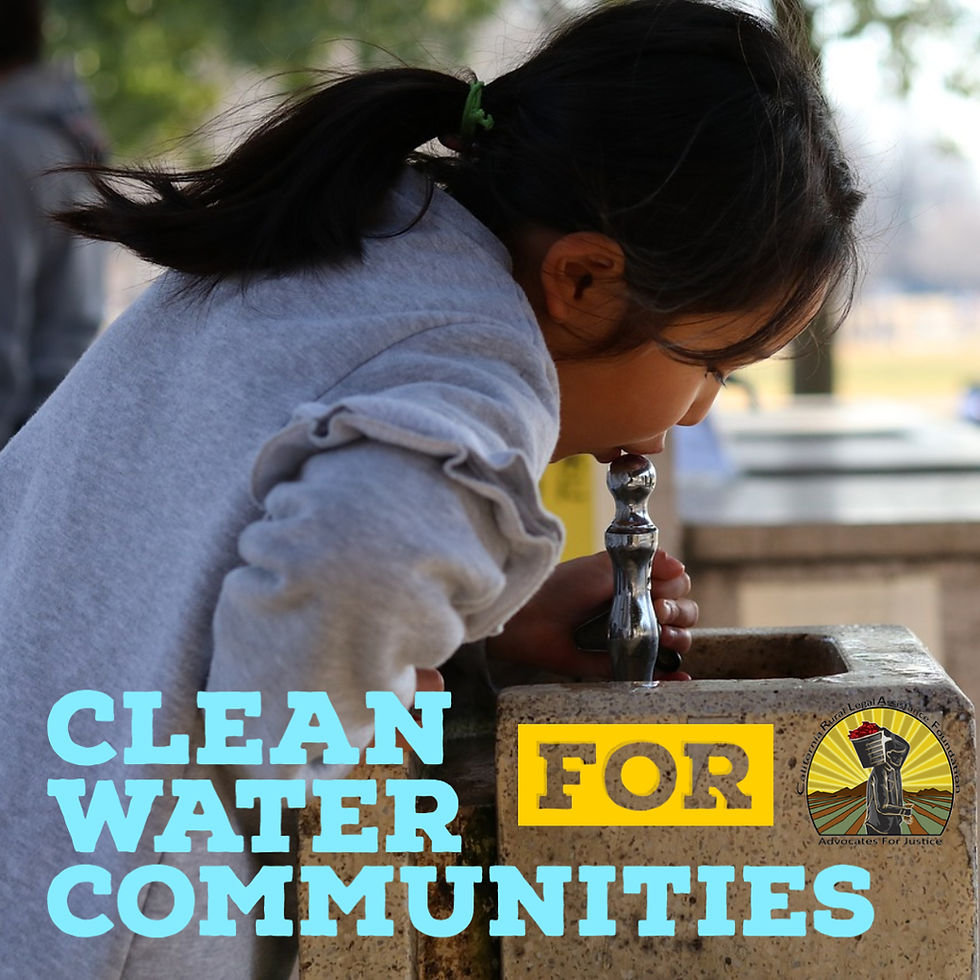Emergency Farmworker Water Provision Project
- Oct 1, 2020
- 3 min read
San Joaquin Valley produces and supplies approximately one-quarter of the nation’s produce. The impact of this multi-billion dollar industry has left aquifers throughout the valley contaminated by pesticides, nitrates, and other related pollutants. Agricultural demand for irrigation water has had an especially detrimental impact on the quality and quantity of well water available for residential use, especially in small, low income communities.

The watersheds that serve the unincorporated communities of El Porvenir and Cantua Creek contain chemicals that exceed the Maximum Contaminant Levels (MCLs) for drinking water. This water is not only unsafe for human consumption, but also fails to support other forms of watershed life.
Since its inception in 2015, CRLAF has organized and maintained the Emergency Farmworker Water Provision Project. We work closely with each of the 744 residents of these two regions to keep everyone informed about the process of gaining potable and reliable water. When the program launched, we went out and canvassed to raise awareness of the program and to begin registering families. We continue to collaborate with key residents of both communities who help spread word of the program and alert us when a new family moves in so that they may be registered for the program. Deliveries of 5 gallon refillable jugs are made to each household twice a month. This bottled water project is an interim and environmentally unsustainable solution that has gone on far too long already.
Through both this project and past work, we have found that on the ground, organized community leadership is the key to long term solutions and getting our legislature to heed these complicated yet basic issues of water quality, access and pesticide use. CRLAF operates as the connector between these rural residents, the water company, Fresno County and the State Water Resources Control Board (SWRCB). We also encourage greater community leadership to ensure both short term and long term water restoration efforts. SWRCB and Fresno County promised that construction of a new well providing safe drinking water will be completed by February 1, 2022. This project will be in effect until that date when the new water system is to be set up.
Before this program, the budget of farmworker families in these regions included gas money to buy drinking water from town 30 miles away. Throughout the Central Valley, it is common that many farmworker housing units do not include running water. A safe and reliable source of running water for sanitation and drinking water is especially critical during the COVID-19 pandemic. Toxic chemical contaminants in drinking water can weaken the immune system, and adequate hydration is very important for people who are ill. Likewise, it is important now more than ever that residents in rural areas, especially those who may not speak English, receive up-to-date and accurate information in particular regard to three intersectional issues: water safety, health and environmental impact.
While many fumigants often do not reach deep groundwater and those that are found in groundwater are legacy pesticides, several herbicides still in use continue to contaminate our water and air, poisoning the lungs of farmworker communities through pesticide drift. CRLAF works closely with Cal OSHA to ensure that safety and health precautions are taken into consideration when working with herbicides and under extreme heat and other stressful farming conditions.
To increase awareness of daily conditions faced by California farmworkers, we encourage all communities living alongside or within these farms to use the bilingual CASPIR App for pesticide exposure incident reporting.
Read more here about our work regulating and banning pesticides.











Comments